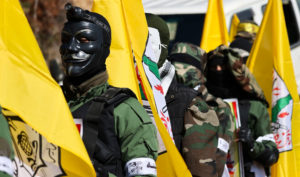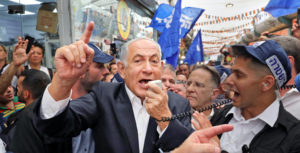Given the headlines this week, you’d be forgiven for thinking Israel was on the brink of civil war. In Tel Aviv, on Wednesday, thousands of anti-government protesters were met with water cannons and stun grenades in a clash with police. This “day of disruption” followed eight weeks of protests against prime minister Binyamin Netanyahu’s plans to reform the Supreme Court. In the eyes of the Western media, courageous liberals are fighting to stop Israel’s democracy from sliding into an autocracy.
Reports of the demise of Israeli democracy are, however, greatly exaggerated. The proposed changes relate to the balance of power between the judiciary, the legislative and the executive branches of government — a matter of usually staid debate among Israeli academics and wonks for nearly three decades. Today’s incendiary rhetoric on the issue says more about the vicious and polarised state of Israeli politics than the controversiality of the Supreme Court reforms.
The protest movement should be seen in the context of ongoing political opposition to Netanyahu. The leading activists resisting the reforms today are the same groups who participated in weekly demonstrations calling on him to resign in 2020 and 2021. Back then, they were motivated by the prime minister’s corruption charges, not by the scepter of drastic changes to the judiciary, but the new protests have piggy-backed onto the old ones.
What’s at stake here isn’t the death of the nation’s democracy, but straightforward party politics. And two incidents that took place last week in the Knesset plenum, Israel’s legislature, illustrate just how ugly everyday Israeli politics has become. During a late night of debating and voting last week, Almog Cohen, a politician from the extremist party Otzma Yehudit, started a live video on Facebook from the plenum, in which he randomly insulted opposition members. “You have to speak to him in his language, like a sheep,” he said of one, making clicking noises at him as if summoning an animal. “She has the voice of a woman who mops floors,” he said about another. He then shouted at a politician who is a medical doctor: “I wouldn’t even let you care for my dog.”
Cohen has since expressed regret. But his was an extreme case in a flood of insulting remarks on all sides. One opposition politician compared the current government to Nazis, and another said that Jews of Moroccan origin, who stereotypically support Netanyahu, would rather go back to living under a king than keep Israel a democracy.
That same night, Boaz Toporovsky, prominent in the opposition party Yesh Atid, returned to the Knesset after missing a month of work after being injured in a car crash. He was there to join his colleagues in voting against part of the judicial reform legislative package. Justice Minister Yariv Levin, the reform’s chief proponent, interrupted his presentation of the Bill from the podium to welcome back Toporovsky, saying: “We missed you.” Netanyahu rose from his seat in the plenum to greet Toporosky and shake his hand. Opposition and governing coalition lawmakers followed suit, standing in a cluster around their friend, who was in a neck brace. The moment of collegiality was caught on camera and published widely.
Then came the backlash: journalist Ben Caspit, a well-known Netanyahu critic, called Toporovsky a “poodle”, who should be “wearing the brace on his head” and not his neck. Many of the protests’ organisers said similar things on social media.
Soon after, opposition politicians started apologising for the mortal sin of being seen smiling next to the prime minister. “We weren’t smiling at Netanyahu; we were happy Boaz returned to us,” Yesh Atid legislator Vladimir Beliak tweeted. “The photo that was taken, under the circumstances, looks bad and I apologise for it.”
An apology for smiling in the general vicinity of the prime minister: here is a neat summary of the demonisation that has been normalised in Israeli politics in the last four years, during which time Israel held five elections rife with mudslinging.
We’ve reached a point where political distrust is so great, it’s getting in the way of compromise being reached. The opposition leader Yair Lapid will not negotiate until the governing coalition agrees to halt all legislation on the judicial reform, which is still in its early stages, while talks take place, saying he won’t negotiate “with a gun to [his] head”. His request was denied, out of concern that the opposition will try to drag out negotiations forever. The two factions are refusing to hash it out in a room together, despite a major effort by President Isaac Herzog to bridge the gap.
Yet, when one looks beyond the ferocious partisanship, the difference in opinion is far less gaping than that between fascism and democracy. The debate over judicial activism began when the Knesset passed a Basic Law enshrining basic human rights in 1992. Israel does not have a constitution, but such laws were meant to be the building blocks of one. Still, they were not treated like a constitution until 1995, when the Israeli High Court of Justice’s then-deputy president Aharon Barak interpreted the 1992 Basic Law as having constitutional weight. The judiciary has used it as grounds to strike down new laws it deems unreasonable ever since.
Notably, Israel’s current political crisis was sparked in 2018, in part, by the court overturning a law: specifically, one that exempted Orthodox men who studied Torah full-time from mandatory military service. The governing coalition, torn over how to proceed, was dissolved soon after.
Though the Supreme Court originally based its authority to strike down laws on treating Basic Laws like a constitution, it decided in 2021 that it could also strike down changes to Basic Laws. In other words, the court would decide whether the democratically elected members of Israel’s legislature could amend the constitution.
Whether or not the court should have the authority it demanded in the Barak years is the central question of the current judicial reform. Supreme Court justices were mostly self-selecting in the years after Barak, so they almost exclusively chose new members of the court who agreed with them. Though a law passed in 2009 reducing the weight of judges’ votes in the committee that appoints their colleagues brought more political diversity to the bench, Barak’s activism remains dominant.
Most of the debate in the Knesset today is about the nitty-gritty of the reform and the rhetoric surrounding it — not about the broader concept of needing, once and for all, to democratically decide how judicial review should work in Israel. Few members of the opposition view the court as untouchable. In fact, two of the opposition parties supported or even proposed their own judicial reforms that are almost identical to what is currently on the table. One of them is led by Gideon Sa’ar, who, in his former capacity as interior minister in 2014, had his flagship plan to curb illegal immigration gutted by the court twice, a turn of events that helped to popularise judicial reform on the Israeli Right.
The vast majority of parties in the Knesset say the court’s power to strike down laws should be more limited, but not wholly eliminated. They also broadly agree that the Knesset should be able to re-pass laws that the court struck down, but are arguing over timing, context, permanence, and how big a special majority should do it. The current Bill suggests that the support of 61 out of 120 representatives should be required, meaning that any governing coalition could re-pass a law. The opposition is arguing for a larger majority, so that invoking the “override clause” would require working across the aisle.
The reform also involves adding more political figures to Israel’s Judicial Selection Committee, so as to give politicians an advantage over jurists. The Bill’s proponents compare it to the United States, where Supreme Court justices are chosen by Democrats or Republicans, but that fact does not put the country’s democratic status in doubt; its opponents point out that the US has a constitution and argue that Israel’s lack of one could make judges beholden to politicians.
These are not debates about democracy or dictatorship. The discussion is, in fact, about the proper balance between different elements of a democracy. If politicians can work together to strengthen Israeli democracy, as both sides say they want to do, they could reach a compromise. But to do so, they’ll have to stop demonising each other.
Disclaimer
Some of the posts we share are controversial and we do not necessarily agree with them in the whole extend. Sometimes we agree with the content or part of it but we do not agree with the narration or language. Nevertheless we find them somehow interesting, valuable and/or informative or we share them, because we strongly believe in freedom of speech, free press and journalism. We strongly encourage you to have a critical approach to all the content, do your own research and analysis to build your own opinion.
We would be glad to have your feedback.
Source: UnHerd Read the original article here: https://unherd.com/






